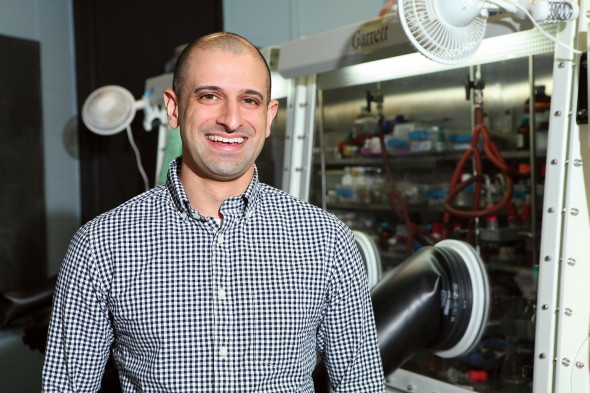Finding cheaper, sustainable alternatives to precious metals

“Our approach is to use two or more earth-abundant metals that cooperate to do what a single precious metal site does,” says Neal Mankad. (Photo: Jenny Fontaine)
Natural Sciences & Engineering
Rising Star
The ancient alchemists searched for ways to transmogrify base metals, like lead, into precious metals such as gold. Neal Mankad, assistant professor of chemistry, is trying to do almost the exact opposite — to swap the rare, expensive and often toxic metal catalysts that have earned their place in the chemist’s toolkit for cheaper and more environmentally friendly alternatives.
But unlike the medieval alchemists, Mankad has had notable success. Just three years after coming to UIC for his first junior faculty position in 2012, he received a prestigious Sloan Fellowship, which recognizes the most promising young scientists in a variety of fields. His research has already received funding from the American Chemical Society’s Green Chemistry Pharmaceutical Roundtable, the National Science Foundation and the National Institutes of Health.
Catalysts allow chemical reactions to occur that otherwise wouldn’t, or would proceed only slowly and inefficiently. They’re used in almost every industrial process and in every biochemical reaction in nature, Mankad says, “so they’re in all parts of our lives.” Like atomic-scale anvils, they provide a surface upon which a process can occur but are not themselves consumed in the process.
Chemists need efficient catalysts to synthesize pharmaceuticals, which are large, complex molecules. They need catalysts to create chemical bonds from carbon atom to carbon atom, and from carbon to other atoms.
The traditional method, Mankad said, is to use single-site catalysis, where a precious metal is used in isolation.
“Our approach is to use two or more earth-abundant metals that cooperate to do what a single precious metal site does,” he said.
“We’ve had an impact because we’ve developed processes that don’t require precious metals like palladium, rhodium, platinum or ruthenium. We try to use earth-abundant metals like copper, iron, or manganese.”
He and his coworkers will soon publish results of a copper-manganese bimetallic catalyst. They are seeking a provisional patent on the process.
Mankad wants to bring this same approach to different areas of science, including energy storage.
“We’re trained to make stuff,” he said. “We synthesize new metal complexes to catalyze reactions, or to understand biological reactions. We make new tools. We want to keep developing new areas where we can take those skills and make an impact.”
Mankad came to UIC after a postdoctoral fellowship at the University of California-Berkeley. He earned his bachelor’s and Ph.D. degrees in chemistry, respectively, at the Massachusetts Institute of Technology and the California Institute of Technology.
